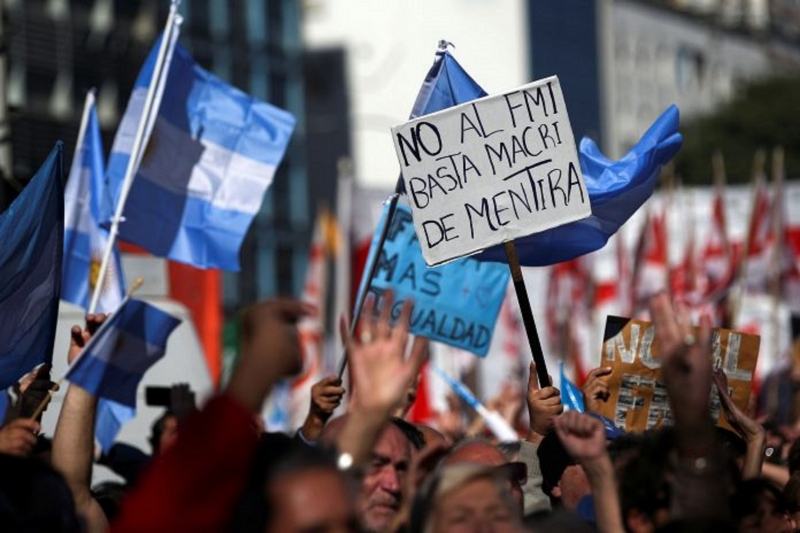Situation in Argentina sharpens its crisis. The agreement with IMF is already 50 billion dollars for a period of three years. Many protests and general strikes are taking place in the country against the policies of the IMF that demands several cuts in the rights of the workrers and social security.
The inflation rises very quickly and the currency loses a lot of influence compared to Yankee dollar. The A Nova Democracia made an article explaining the contradictions in this crisis that arte still valid for this period.

"General strike in Argentina paralyzed the country"
"On September 25, the second general strike since the agreement signed with the International Monetary Fund (IMF) occurred, the fourth to take place under Macri government. This was the biggest. There was the adhesion of the main trade unions, students and society in general that demanded change: the abandonment of economic policy dictated by the IMF.
The result of the strike was overwhelming, total and nationwide. Some organizations have chosen to recommend that the complainants stay at home and others have called for picketing and demonstrations.
The day before the strike a large demonstration took place in Plaza de Mayo, in front of the government headquarters, Casa Rosada. At that moment, Mauricio Macri was already in the USA to expand his agreement with the IMF.
The people have been suffering, according to official information, inflation around 45% a year, and the unemployment reaches 10%. The poverty index rose to 27.2% of the population, and in its Macri electoral campaign, "zero poverty" was the central objective of its management.
The Macri family made a fortune in the business base in timely alliances with successive governments. In the period of President Menem won the concession of the Argentine Mail for 30 years. The publicity of the privatization agreement promised better services, more efficiency for a lower rate. The fraudulent management of the Macri, besides laying off thousands of workers, worsening services and increasing tariffs, left a debt that, according to official calculations, exceeds 4 billion dollars.
Among the flags of the strike was the denunciation and the struggle to prevent the president from being able to forgive the debts of his family with the old state. Shortly before Macri had forgiven another debt of his own with the state of $ 500,000.
The agreement with the IMF, which initially consisted of a $ 50 billion loan, was extended by an additional $ 7 billion. Of that money, $ 15 billion has already been given, without any improvement in the economic indexes. The counterpart imposed by the IMF is more burdensome for the people with withdrawal of labor and social security rights, "fiscal adjustment" (cuts in basic services like health, education, housing, etc.) and other attacks.
To get an idea of the economic debacle: in April, with a dollar bought 20 pesos; in September a dollar exceeded 40 pesos. This devaluation has a direct impact on the national economy.
In an economy with prices strongly tied to the dollar, the purchasing power of the population has declined enormously. In addition, all the subsidies that were intended to alleviate the high costs in energy and transport tariffs, for example, were cut. The agreement with the IMF imposes draconian sacrifices that perpetuate the debt and subjugation of the Argentine nation."
